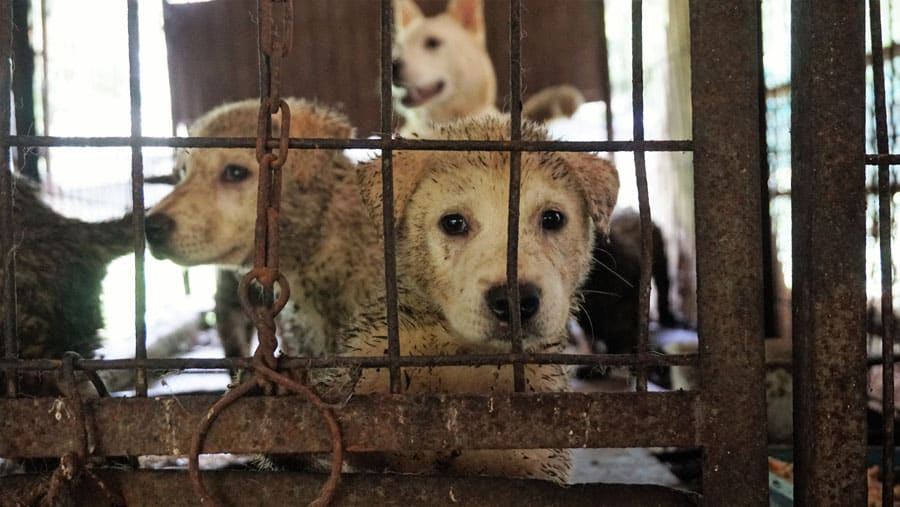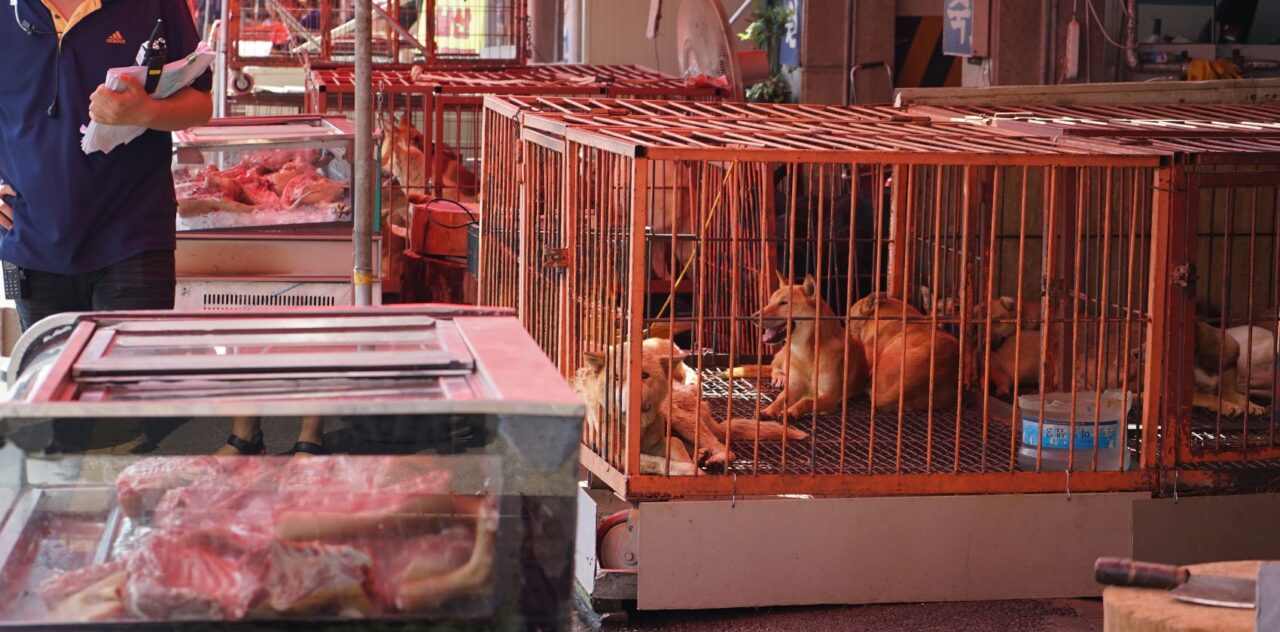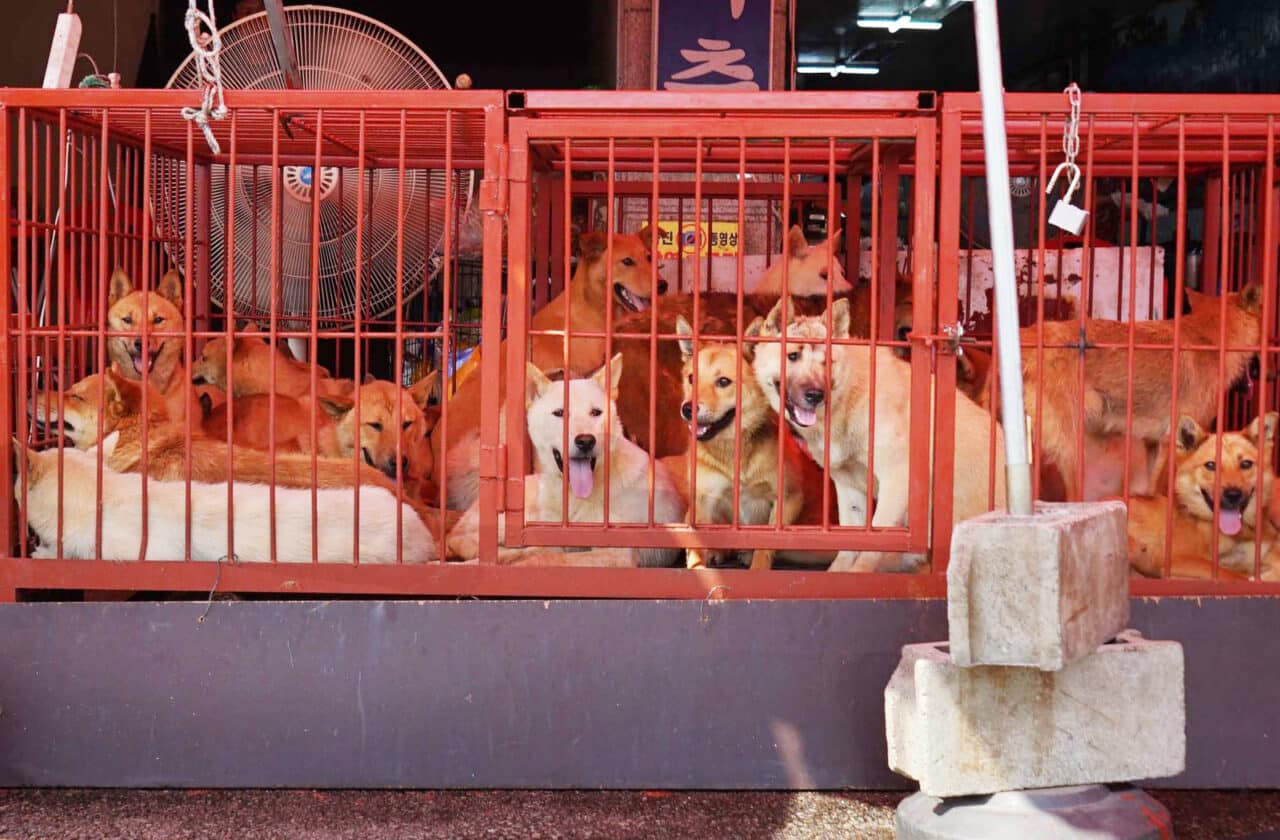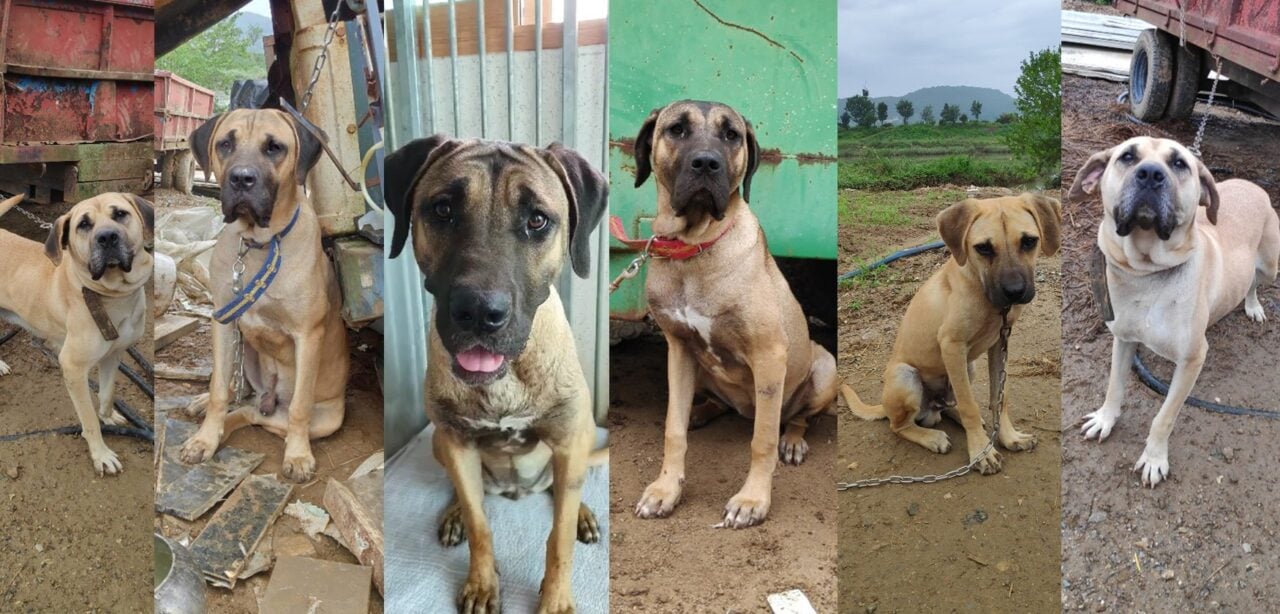South Korean President Considers Ban on Dog Meat Consumption
It is no secret South Korea is an epicenter of the Asian dog meat trade. It also distinguishes itself as the only country in the world that commercially farms dogs for food, backed by the National Dog Farmer Association, a registered local group that exists to support its farmers and lobby to keep dog meat legal in Korea.
Quick Facts
The consumption of dog meat has long been practiced in South Korea, although not exclusive to the region. Many neighboring countries, including China, Cambodia, Indonesia, and Vietnam consume dog meat as a norm, believing it to possess a myriad of healing properties that promote enhanced immunity and stamina. Dogs of all breeds and sizes are victimized but are almost always under the age of 2 or 3. To prepare the meat, dogs are tortured under the misguided belief the release of adrenaline will maximize nutritional properties. Dog meat consumption is practiced year-round, it is most popular and served as stews and tonics during hot summer weather and Boknal, the “dog days” of summer, which makes up 70%-80% of the year’s dog meat consumption during the celebration. For China, the equivalent is the infamous Yulin dog meat festival.
According to the Korean Dog Meat Farmer’s Association, there are approximately 4,000 registered dog meat farms and nearly 3,400 restaurants in the country serving dog meat. This count does not include operations not registered with the association, individuals who raise dogs for personal consumption and supplementary income, or restaurants with “hidden menus” serving dog meat. Due to the lack of formal information, the estimated number of dogs that are consumed in a year ranges anywhere from 1 to 3 million.

Current Laws
Despite a formal association for dog farmers, the dog meat trade remains a federally unregulated industry in Korea and lies within a political grey area with contradicting laws, and no precedent to guide current rules and regulations. Dogs are not classified as livestock under the law and therefore are an unregulated industry without protection against sourcing, health, safety, and hygiene practices. They are, however, classified as food under the Ministry of Health and Welfare, which vaguely defines food as simply “any edible product with the exception of drugs”.
Animal welfare laws lag behind its “industrialized country” peers.
Korea passed its first and only Animal Protection Law in 1991, which’s statutes were extremely vague and open to interpretation. While the legislation does not explicitly prohibit the slaughter of dogs for consumption, it prohibits “killing animals in a way which is cruel or without proper, rational reason”, “inflicting unnecessary pain or injury to an animal” and “killing dogs in public areas”. In spite of this, it provides no definition as to what constitutes “cruel” or a “public space” and is rarely enforced, much to the chagrin of animal rights advocates.
“Hasn’t The Time Come to End Dog Meat Consumption?”
The head of the country’s leadership, President Moon Jae In has been reported to have asked this question to Prime Minister Kim Boo Kyum in a weekly meeting. This has not been the first time President Moon has raised questions on animal welfare. A self-proclaimed dog lover, he pledged to adopt a rescue dog during his 2017 presidential campaign where his platform also included plans to build more dog playgrounds, promote adoption for abandoned animals, standardize medical costs for animals, expand free spay/neuter clinics for the population control, and expand feeding facilities for stray cats. His rescue dog Tori was adopted shortly after he took office, and became the first rescue dog to move into the Blue House. However, he was not the only candidate to incorporate animal welfare issues into his platform.
During the 2018 Pyeongchang Winter Olympic Games, in response to the mounting pressure and criticism from the international community over dog farming practices, authorities moved to shut down several dog meat markets and invoked animal welfare legislation in the months leading up to the Games. Similar initiatives were also in place during the 1988 Olympics, banning dog meat restaurants for fear of generating negative publicity. Such measures have angered dog meat supporters citing the criticism as a double standard, racist, an attack on local, deeply rooted practices, and an attempt to force Western values upon local traditions.
There is a fine balance to walk when addressing topics as sacred and revered as culture or tradition. However, in those respects, we believe in a culture of compassion that knows no borders. While our work happens to focus on a specific region and cause, Korea is not the only country in the world whose practices are frowned upon by the rest of the world. Bear bile, seal clubbing, and animal fighting, only to name a few, still exist around the world in the name of culture and tradition.
What Will This Mean?
The formal banning of dog meat consumption will be a huge step forward, but its immediate impacts will be even bigger and unfortunately, equally grim. If the legislation passes, the estimated 1-3 million dogs on farms would then be left “homeless”. With Korean shelters already struggling to keep their heads above water with skeleton resources, the sudden surge of dogs in need will be overwhelming. The sad fact is that without sufficient funding and resources to support these now homeless dogs, the only solution left will be euthanasia. This is especially true for those with medical and behavioral issues as their needs put greater strain on an already frail system.
Implementing a legal ban where strong beliefs and heavy resistance still remain within some demographics creates a demand for an illegal black market, which could be darker and more dangerous. In an already unregulated industry, it’s difficult to imagine how much worse it could become, but being hidden away from public eyes and animal rights watchdogs, what we imagine as the impossible could very well become a possible reality.
What is Needed?
In the end, the driving force behind the continued dog meat trade is the demand, and that lies within cultural views and beliefs. In general, Korea has been moving away from a culture of dog meat consumption. Younger generations have no interest in these traditions, nor in inheriting their family farms. A poll conducted by Humane Society International (HSI) in October 2020 showed that 84 percent of South Koreans have not consumed dog meat in the past or do not plan to, while nearly 59 percent said they would support a ban on the dog meat trade, compared to 35 percent in 2017 for the latter matter.
Pet ownership is also on the rise, with an estimated 6 million households who own dogs as companion animals in 2020. This has subsequently given way to a steady rise in the pet industry catering to doting owners, offering a wide range of accessories such as scarves, bows, and clothing. The growing rate of dog ownership brings younger generations a first-hand understanding of dogs’ potential to be companion animals, as well as sentient beings where they might have otherwise been taught differently.
While these are promising prospects and a great step forward, progress is also not linear. The legislation does not always equal enforcement. The rule of law must be upheld and maintained to be effective. This may be able to move swiftly, however, beliefs and opinions which are the ultimate necessity, will ultimately be a slower process to shift, if possible.
We are also, despite rising popularity in dog ownership, continuing to fight the stigma surrounding dog meat farm rescues and shelter dogs as a whole. The dog culture is still developing, and we continue to grapple with high surrender rates and specific preferences for breeds and sizes. Toy-sized dogs remain the most popular and high in demand, while mixed breeds are overlooked in favor of pure breeds. There remains a strong belief that shelter dogs are sick, dirty, have behavior issues, cannot assimilate into life as companion animals, are too old, and the list goes on. We continue to see these challenges on the adoption front; Another reason international adoption programs are still needed is to alleviate the local shelters and rescues.
Progress is Progress
Any step forward is a step in the right direction. We are glad and welcome it openly. On the political front, the dialogue on banning the trade and consumption of dogs is not a new development. President Moon had informally mentioned it during his 2017 presidential campaign, and his rescue dog Tori is said to have attended an anti-dog meat protest with his daughter in 2018 when international criticisms shone a light on the practice during the Olympic games. Having been silent on the issue since then, his administration has since stated the need to consider the livelihoods of people in the trade despite a petition with over 200,000 urging him to make good on his word.
Four years later, his recent statement has not fallen on deaf ears but instead sent shockwaves across the world. The world has indeed heard. We have heard. We are listening. And we are hopeful.
Subscribe for Updates
Get our dogs in your inbox once a month, along with our latest news and events. We never send spam, and you can opt out at any time.








